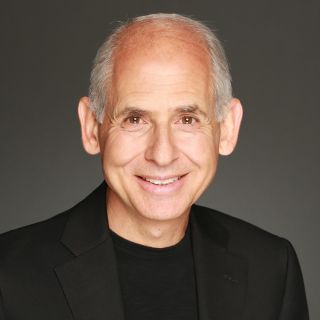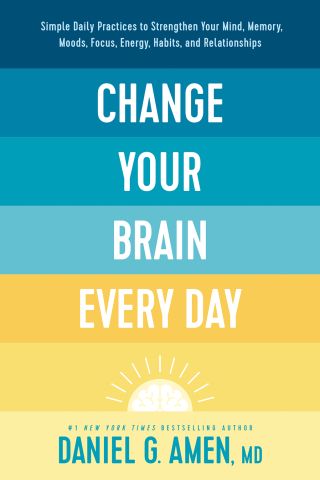Relationships
Change Your Brain Every Day
The Book Brigade speaks with psychiatrist Daniel Amen
Posted March 23, 2023 Reviewed by Lybi Ma

Every thought you have, every move you make, and everything you do is a product of brain activity. What steps can you take to make sure it is in top working order?
Book Brigade: What do you consider the single most important thing to change about the brain, and why?
Daniel Amen: Changing the overall health of your brain is the most important thing you can do to improve your emotional well-being, success at work, and relationships. Your brain is involved in everything you do, think, and feel. With a better brain, you have a better life.
And what do we do and how do we do it?
In the same way that physical health is a daily practice, brain and mental health require daily practice. Adopting daily habits that boost brainpower rather than diminish it is the key to a better brain and life. I often teach people about the four circles of health and illness: biological (the physical functioning of the brain), psychological (mind), social (relationships and current life situation), and spiritual (why you care, meaning, and purpose).
Under the biological circle, I use the acronym Bright Minds to help people remember what to do. B is for boosting blood flow (think: physical exercise and avoid things that hurt blood flow, such as alcohol, nicotine, and caffeine). R is for putting off retirement and aging by engaging in lifelong learning. I is for decreasing inflammation, often accomplished by eliminating processed foods, flossing, and taking omega-3 fatty acids. G is for addressing any genetic risks, by being on a serious prevention program (I have obesity and heart disease in my family, but I don’t have either and am on a prevention program every day of my life). H is for protecting your brain from physical trauma. T is for avoiding toxins (environmental toxins as well as alcohol, drugs, and nicotine). M is for treating any mental health issues. The second I is for optimizing the immune system and treating any infections. N is for regular testing and optimizing neurohormones. D is for preventing or reversing diabesity (a combination of obesity and diabetes). And S is for making sleep a priority.
How does anyone know whether their brain needs changing and exactly what needs changing?
When your brain works right, you work right. When you have trouble in your life, there’s a good chance you have a troubled brain. If you struggle with focus, moods, anxiety, obsessive tendencies, or addictions, for example, or if you can’t maintain healthy relationships, it’s likely that your brain could benefit from optimization. The brain is the most important organ in the body, yet is rarely ever screened for trouble. Regular cognitive testing is useful.
What is brain envy and why does anyone need it? And how does someone get it without subjecting themselves to a brain scan in the absence of overt indications for one?
Most people never think about their brains. They focus on the things they can see—their wrinkles, bellies, or hair color. Brain envy simply means learning to love your brain and developing a desire to have a better brain.
What is the evidence that optimal brain health is “fundamental to achievement and prosperity.” What about Isaac Newton? Vincent van Gogh? Ernest Hemingway? Their achievements are enduring.
In Change Your Brain Every Day, I also write that having a healthy brain is also fundamental to happiness. To have the trifecta of achievement, prosperity, and happiness, you need a healthy brain. Newton, Van Gogh, and Hemingway undoubtedly delivered great achievements. But happiness? Newton endured an 18-month period of depression and psychosis. Van Gogh died of a self-inflicted gunshot wound at age 37. And Hemingway also died by suicide, at age 61.
What are the signs of optimal brain health?
When your life is balanced and things are going well in terms of your cognitive function, memory, mental health, energy, relationships, and sense of purpose, it’s a sign of a healthy brain.
You advise people to avoid anything that hurts their brain —including “retirement, aging.” How do you suggest that people avoid aging?
The brain typically deteriorates with age, but it doesn’t have to. You can slow or reverse the aging process by continually learning new things, engaging in a variety of mental exercises, being physically active, and eating a healthy diet. Some research shows that delaying retirement may ward off dementia.
You assign individuals the responsibility for their own brain health. But what if there are large institutional forces working against brain health—environmental toxins spewed by polluting companies, lies spread by giant media companies? Who has responsibility then? As a promoter of brain health, what are you doing to promote brain health at the societal level?
As much as possible, individuals do need to take responsibility for their own brain health. Part of that includes being aware of external societal factors that are harming our brains and doing the best you can to keep your brain out of harm’s way. Educating yourself about damaging environmental factors, such as toxins and junk foods that drive anxiety and depression, is key to making the best choices on a daily basis to counteract these factors.
Personally, I share information on how to fight back against these forces with millions of followers online. I was one of the creators of the Daniel Plan, a program to help people worldwide get brain healthy through religious organizations. I have spoken at the National Security Agency, the Department of the Interior, the National Council of Juvenile and Family Court Judges, and more. Through education, we can empower people to win the war for their brain health.
If I were to have standard medical laboratory work done, presumably blood work, what would it tell me about my brain and what to do about it?
Medical blood work can be very helpful in finding the root causes of brain health and mental health issues. For example, studies show that having low thyroid levels reduces overall activity in the brain and can produce symptoms such as depression, memory problems, and trouble with attention. Similarly, research shows that low levels of vitamin D are associated with cognitive decline. Optimizing your important lab numbers enhances brain health.
Do you have a recommendation for withstanding stress that goes beyond the standard one and that does not involve some proprietary formula?
When you make brain health a daily practice, you boost something I call “brain reserve,” which is the extra cushion that increases your ability to cope with the stressors that life throws at you. In times of extreme stress, relaxation techniques such as deep breathing and meditation can be beneficial.
If you had to limit yourself to one item, what one idea or insight would you like people to get from this book?
The biggest lesson I have learned from our brain-imaging work is that you are not stuck with the brain you have. You can make it better. The one tiny habit I ask all of my patients to do every day is before they make any decision, ask themselves if it is good for the brain or bad for it. If they can answer it with information and love, the health of their brain will start to improve quickly.
About THE AUTHOR SPEAKS: Selected authors, in their own words, reveal the story behind the story. Authors are featured thanks to promotional placement by their publishing houses.
To purchase this book, visit: Change Your Brain Every Day





